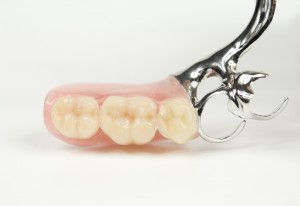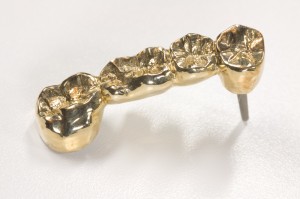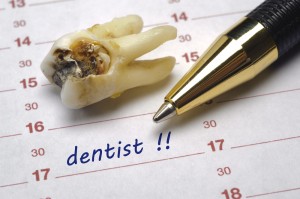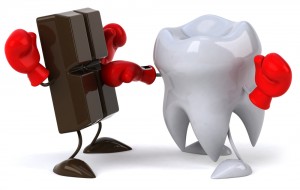
Whether you’ve lost a tooth to an accident, decay or gum disease, you have three options for replacing it: a removable partial denture, a fixed bridge or a dental implant.
Removable partial denture
The most economical way to replace missing teeth, a single removable appliance can replace several missing teeth as long as there are solid teeth on both sides of the partial denture. Removable dentures aren’t as comfortable as fixed bridges, and the clasps that keep them in place may not be completely concealed. The quality of partial dentures vary, from inexpensive plastic “dental flippers” with a false tooth attached to the more sturdy metal and acrylic “Nesbit.”

Fixed bridge
More expensive than a removable partial denture, a fixed bridge is a permanent option for replacing a missing tooth. The teeth on either side of the missing tooth are treated for dental crowns, which are then attached to the teeth and have a false tooth between them. Fixed bridges generally look and feel like your real teeth. The main disadvantage is that the teeth it’s attached to must be filed and prepared for the crowns, whether or not these teeth are healthy. Continue reading →

“TMJ” refers to Temporomandibular joint disorder. The Temporomandibular joint connects the lower part of the jaw, the mandible, to the temporal bone in the skull. TMJ is a term that covers a variety of chronic or acute pain or inflammation in the muscles surrounding the temporomandibular joint.
Some common symptoms of TMJ include:
- Pain or discomfort when biting, chewing, or speaking
- Popping or clicking sounds when opening and closing the mouth
- Headaches or migraines
- Limited mobility of the jaw
- Swelling in the face
- “Earache” or generalized pain around the ears
- Ringing in the ears Continue reading →

Diabetes is a condition in which the body is not able to effectively regulate blood sugar levels. Since blood circulates throughout the body, the condition can contribute to a wide range of health challenges, including a variety of dental problems.
Gum Disease
Diabetics tend to have more frequent bouts with gum disease than is typical for non-diabetes. In addition, gum disease among diabetics often takes on a more severe form. These problems, also known as gum inflammation, gingivitis and periodontitis, are caused by a combination of factors. Diabetes weakens white blood cells, depriving the body of one of its most important defense mechanisms against bacterial infections. In addition, diabetes leads to thickened blood vessels which are less efficient at carrying away waste products. The mouth can therefore become a breeding ground for the bacteria that cause gum disease. Continue reading →

Anyone who has ever experienced a severe toothache will tell you that you do not want to neglect dental care until a tooth decays to the point of intense pain. Many will agree that a toothache is one of the worst types of pain that one can experience. A toothache tends to feel worse at night with dull, throbbing pain that seems to increase when one is lying in bed. While pain pills might relieve a toothache temporarily, the best remedy is to get rid of the decay that is causing the ache by filling the tooth or extracting it. However, if one takes a proactive approach, the ache can be prevented, and the tooth can be saved. If your dentist has told you that you need a filling, but you are not feeling any pain, there are some things you need to know about tooth decay.
Poor oral care leads to tooth decay. Neglecting brushing and flossing results in a tooth becoming exposed to acid producing bacteria. Tooth decay occurs as the acid and bacteria eat into the tooth. Initially these destructive bacteria can go unnoticed, so in the early stages of tooth decay; it is not unusual to experience no pain at all. However, as the decay persists a hole will appear in the affected tooth, allowing the nerves to be exposed. Exposed nerves bring pain. When the decay goes unchecked it can reach the point where the only relief is to extract the tooth. Continue reading →

Despite the recommendation that people visit their dentist twice a year, many adults instead choose to ignore this advice. They may develop a fear of going to the dentist or believe that they do not need regular dental care. If it has been a long time since you have visited the dentist, you may not be sure of what you need to do once you decide to make an appointment. The best approach to beginning regular dental care is to treat this visit as you would any other important medical appointment. Continue reading →

It is common for women to have questions about the potential risks of having dental procedures during pregnancy. Annual exams or a routine dental cleanings are completely safe procedures to have when you are pregnant. A woman’s body experiences an increase in the level of hormones during a pregnancy. This can cause the gums to bleed and swell. Food may become trapped causing an irritation to your gums. It is critical that a woman does not neglect preventative dental work during her pregnancy. Gum disease and other oral infections have been associated with premature births.
Regular dental work during a pregnancy
Crowns and cavity fillings should be taken care of during pregnancy. Having these procedures will reduce the possibility of infection. The second trimester is the ideal time to have these procedures done. Many women have problems lying on their back for a long period of time when they are in the third trimester. Continue reading →

What is Plaque?
Individuals with yellowed teeth may have a buildup of plaque. Plaque forms on tooth surfaces from deposits of bacteria. Scientific researchers have identified hundreds of species of bacteria that live in a human’s mouth. However, there are actually thousands of bacterial species that live in the human mouth. Dentists know that because teeth remain in the mouth for many years bacteria can easily cover dental surfaces. Regular brushing and flossing of teeth can prevent plaque from destroying tooth surfaces. In addition, proper dental hygiene assists in avoiding painful infections to tissues inside the mouth.
Dental Cavities
The sticky and yellow material on an individual’s teeth is actually biofilm. Biofilm is dangerous to the surfaces of teeth, gums, bones and ligaments inside the mouth. There are studies that reveal that dental plaque can cause additional health problems such as heart disease. Bacteria from plaque commonly cause cavities and gum disease in children, teenagers and adults. Tooth decay from plaque’s bacteria requires immediate treatment from a dental professional. Small cavities in teeth are easily repaired with color matching composite material by a dentist. Continue reading →

For many people, the thought of going to the dentist is enough to cause to them to grit their teeth. They would rather endure the pain of a toothache or risk tooth decay that step foot into the dentist’s office. However, sedation dentistry can take the fear out of the visit.
Maybe you are not necessarily afraid of the dentist but have another issue. You may have a low threshold for pain or extremely sensitive teeth. You may have a bad gag reflex that makes it difficult for the dentist to work. It may be that you have a lot of work that needs to be done that will be difficult to sit through for hours. The sedatives can make it easier on you and the dentist.
Sedation dentistry is the use of medication to help the patient relax during the procedure. It is sometimes called “sleep dentistry,” although that is not entirely accurate. The patients stay awake during the appointment, except those who are under general anesthesia for a surgery-like procedure. Continue reading →












